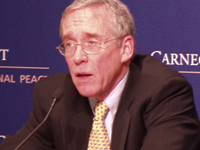Registration
You will receive an email confirming your registration.
The bursting of the oil bubble, which had in recent years led to extraordinary financial gains for Russia, is the chief culprit in Russia’s current financial downturn. As protests against the government spread throughout Russia in response to the crisis, Moscow faces the prospect of serious economic, social, and political turmoil. Economists Clifford Gaddy and Barry Ickes were joined by Carnegie’s Rose Gottemoeller and Mark Medish to discuss the underlying policies that have given rise to the current problems and what can be done about it.
Ickes and Gaddy emphasized that truly comprehending the effects of the international financial crisis on Russia, as well as the necessary solutions for it, require an understanding of the forces driving the economic policies and agenda of the Putin administration. They cited four key premises that explain the ideological foundation of the Putin regime:
- The economy is Russia’s key strength in the world.
- The economy should be as strong and as efficient as possible.
- The economy should ensure the priority of the state.
- The economy must be robust to crisis.
Ickes and Gaddy argued that it is the inherent tension between ensuring the priority of the state and maintaining an efficient and strong economy that have led and continue to lead Putin to keep a “protection racket” in place. This protection racket is a deal between the government and oligarchs that sustains the latter's rights to private property in exchange for allowing Putin to have strategic input into company affairs. It has remained in place despite the current economic crisis.
Gaddy and Ickes concluded that Putin has no intention of ending this scheme and, as a result, has not yet chosen to nationalize the companies and oust the Russian oligarchs, despite the difficulties they have had with financing and otherwise maintaining their companies.
Causes for Crisis
By examining currency exchange figures and other economic indicators, Gaddy and Ickes argued that political events were not responsible for Russia’s crisis. They point out that in early August 2008, in the days following the beginning of the Russia-Georgia conflict, Russia’s currency exchange rates did decline but they fell along with a number of other countries throughout the European Union. It was the decline in the price of oil that led to Russia’s current financial position.
This view was not shared by everyone. Andrei Illarionov commented that oil prices alone could not have been the sole factor in explaining the decline in the ruble. He also insisted that Russia had indeed suffered more than other countries in the current crisis, a fact that also could not, be explained by the oil price reasoning.
Future Expectations
When asked about how Russia’s economy would likely influence geopolitical actions, Gaddy and Ickes explained that the status of Russia’s economy has little impact on its behavior. They reemphasized that the real issue for Russia has been achieving financial independence. The Putin government will hold on to that independence at all costs, never allowing, for example, the stabilization fund to be completely depleted. As social protest begin to emerge in Russia due to economic hardship, this insistence may be politically costly to the regime.
Ickes predicted that Russia would not default on foreign debt during this crisis because the Russian leadership has never looked favorably on this option. Gaddy explained that if the Russian government is forced to bail out a company it will take at least partial ownership of it.
Solutions
In attempting to find a solution for the crisis, Gaddy and Ickes did not advocate for immediate diversification away from oil. Their suggestion instead was for Russia to begin with diversifying within their own oil market, allowing more small and medium-size energy companies to operate in Siberia. Diversification of such a crucial industry would not only improve Russia’s energy business, but would also serve as an important first step in a larger diversification process.
The economic crisis, Gaddy and Ickes warned, poses an important medium-term challenge for Russia: how to ensure future oil production. Due to low oil prices, the production of rents from oil is more pressing now than it was during the boom years. Although Putin’s system had worked for 8 years, it may not continue to work in the future should oil prices remain low.
